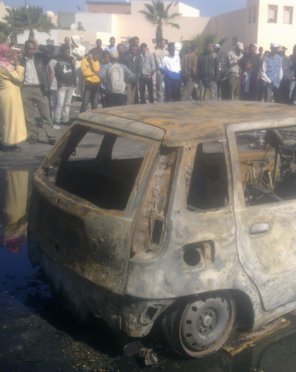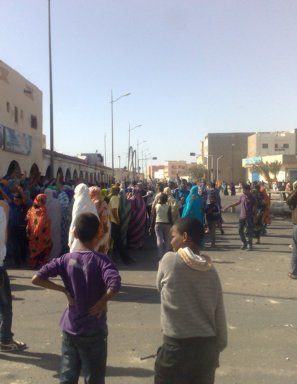|
Morocco | Western Sahara Human rights | Politics New clashes in occupied Western Sahara
According to pro-Sahrawi sources, "the situation in Dakhla is aggravating," following clashes on Friday and Saturday. The indigenous Sahrawi population reportedly clashed with civilian Moroccans, who have settled Dakhla in masses since the 1976 Moroccan occupation and now totally dominating economic and political life in the city.
Today, Sunday, there are however reports of Moroccan riot police controlling the streets of central Dakhla, trying to prevent Sahrawi residents from staging new protests. However, Sahrawi neighbourhoods in Dakhla remain mostly unprotected and residents fear new attacks during the day. The cities of Western Sahara, where the vast majority of the Sahrawi population strongly opposed the Moroccan occupation, have been remarkably calm during the last weeks, as youths and civil society in Morocco-proper have embarked on a wave of pro-democracy protests. It is widely believed that the Sahrawis do not want divert attention from these protests in Morocco by creating unrest in Western Sahara. There have been contradicting news about Moroccan troop movements in Western Sahara. Several sources two weeks ago said Moroccan troops were moved out off the territory to prepare for the announced protests in Morocco-proper. This week, local sources claim that large army contingents again are moved into occupied Western Sahara. Dakhla is the second largest city in occupied Western Sahara. The territory's capital, El Aaiun, has been calm since the protests in Morocco-proper started. There are also no reports of unrest in the major Sahrawi town of Bojador and S'mara, further indicating that the Dakhla unrest is not part of any planned Sahrawi protest movement. By staff writer © afrol News - Create an e-mail alert for Morocco news - Create an e-mail alert for Western Sahara news - Create an e-mail alert for Human rights news - Create an e-mail alert for Politics news
On the Afrol News front page now
|
front page
| news
| countries
| archive
| currencies
| news alerts login
| about afrol News
| contact
| advertise
| español
©
afrol News.
Reproducing or buying afrol News' articles.
You can contact us at mail@afrol.com









